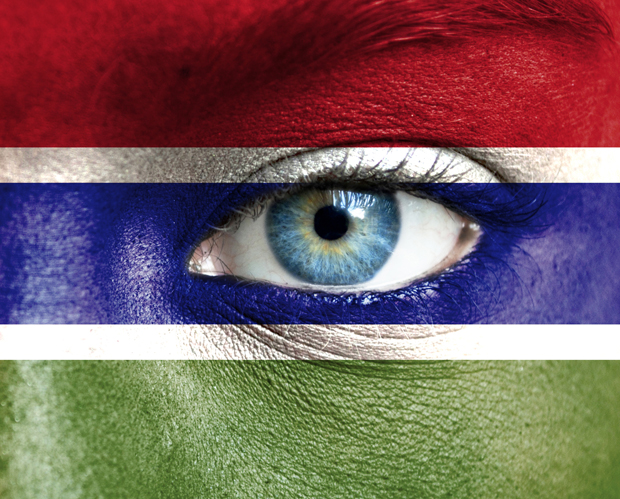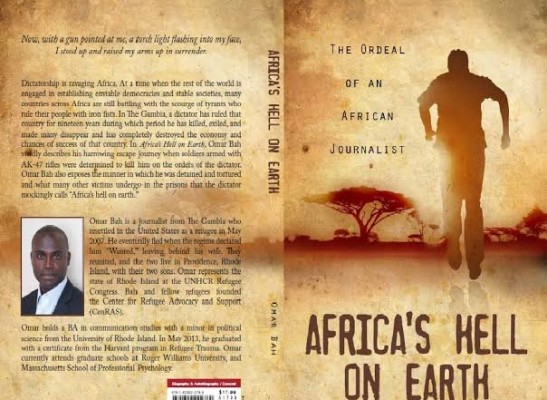6 May 2014 | Gambia, News and features

(Image: Shutterstock)
The campaign for media freedom in Gambia has lobbied the United Nations to take measures to address media freedom in the West African state. This comes amid a lingering struggle for freedom of expression and press freedom in the country, where over 110 journalists have gone into exile for fear of persecution.
Speaking at an event, journalist Omar Bah, author of the Africa Health on Earth, told delegates that journalism is the most dangerous profession in Gambia, adding there is the need for more awareness in the Gambian public to ensure divergent views for better democratic governance.
Bah, a survivor of torture who was presenting a paper on human rights, corruption, injustice and freedom of press, said: “We are way behind in terms of awareness due to censorship. If you write on a critical issue against the regime you are seen as inciting the people against the government.”
The Gambian writer said that in July 2013, the government directed the Public Utility Regulatory Authority to ban the use of free internet phone services using Voice over Internet Protocol (VoIP). Bah called this action a violation of press freedom. He added that the government said anyone using VoIP phone service was depriving the country of revenue from international and national calls and was therefore committing an economic crime. It subsequently stepped back from the ban but imposed stiff charges on internet cafes for use of VoIP.
He said the government pushed through legislation to impose sanctions on government officials and other individuals who give stories to Gambian online news outlets outside the country, with a penalty of a 15 year jail term or a fine of more than £47,000 for miscreants.
“I cannot imagine 110 journalists going into exile in small a country like Gambia, this shows how serious it is,” he stated. The figure is based on research conducted by the DOHA Centre for Media Freedom through the Dakar based inter-African Network for Women, Media, Gender Equality and Development, in collaboration with the International Federation of Journalists and the Gambian Press Union.
Bah also gave a vivid recollection of the 1999 media commission bill, the media amendment bill in 2004, the killings of Deyda Hydara, former co-proprietor and managing editor of the Point Newspaper, and Omar Barrow, former Sud FM Banjul reporter and Red Cross Volunteer, as well as the disappearance of former daily reporter Chief Ebrima Manneh, and torture of Musa Saidykhan.
“Media freedom has become worse in the Gambia, where there is too much arbitrary arrest, torture, killing and interference in the work of journalists, therefore, there is a need for a more global awareness on the issue to ensure that we have a free and vibrant media,” he concluded.
This article was posted on May 6, 2014 at indexoncensorship.org
3 Mar 2014 | Gambia, News and features

Driven into exile by the brutal regime of Gambia’s president, Yahya Jammeh, journalist Omar Bah’s dramatic flight from his homeland is recounted in his memoir Africa’s Hell on Earth: The Ordeal of an African Journalist.
An outspoken critic of the country’s autocratic ruler, Bah was forced to flee Gambia for neighbouring Senegal, where he was welcomed by other Gambian exiles who had settled in Dakar. Later, his path led him to Ghana and eventual resettlement in the US.
“I wanted to use my new found freedom in America to speak up because I regained the voice I lost. The book is my source of rejuvenation, my symbol of refusal to be silenced, and the avenue to continue to expose corruption, mismanagement, torture, repression, killings and the general dictatorship in The Gambia. I feel I owe it to the suffering people in The Gambia”, he stated.
Bah fell from grace after he was suspected of the being an informant for US-based Freedom, an online news site critical of the Jammeh regime, while working for the pro-government Daily Observer newspaper.
As a US resident, Bah says he feels challenged to speak about the injustices and give a voice to the voiceless since he now has the ability to speak up against the dictatorship in the Gambia without fear of reprisal.
“The name of this book, Africa’s Hell on Earth, refers to the nickname of the infamous Gambian prisons where so many people have disappeared. The prisons are overcrowded, and there are lots of diseases, torture, executions and suffering. Worse still, majority of the detainees are there simply because they oppose the regime. The Gambian dictator, Yahya Jammeh, has ruled for nineteen years. During this period, he has killed, tortured and exiled many Gambians.”
He said the Gambia is a country where is so much poverty while the powers that be live in luxury without regard to the poor and sick population. The writer bemoaned the situation of the Gambian people, who are subjected to summary executions if they dare oppose the regime.
In a review of Bah’s book Demba Ali Jawo, a former president of the Gambia Press Union, described it as an accurate depiction of the obstacles Gambian journalists have faced since the Jammeh regime came to power. Jawo called the book an invaluable reference for those interested in documenting the atrocities being committed against innocent Gambians by their own government.
According to Jawo, Bah narrowly escaped a dragnet that had been thrown around the Gambian capital, Banjul, to arrest him. A soldier let Bah pass through a checkpoint.
“By letting Omar go, the soldier not only risked his own job and life, but he also had to forego promotion and even compensation if he had handed him over to the authorities”, Jawo observed.
Bah now lives in Rode Island with his wife and two sons is attending graduate school through scholarship. He is the founder of the Center for Refugee Advocacy and Support and represents the state of Rode Island and the Northeast region at the Washington-based UNHCR Refugee Congress.
“When I look back at my journey, I feel my struggle was worth it. Despite the danger I had put myself in, and all that I went through, the nation of the United States of America, out of all the countries in the world, gave me the opportunity to begin a second life. Today, I feel my new life in America, though just starting, has been dearly meaningful. I am thankful to this country.”
He advised fellow refugees and immigrants make use of the opportunities that they have in the US and remember that there are millions who remain in the camps with no hope of rebuilding their lives.
This article was published on March 3, 2014 at indexoncensorship.org


